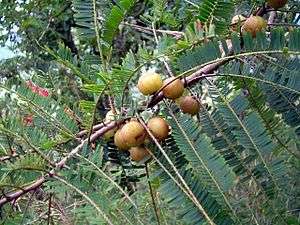Triphala
Triphala ("three fruits")[1] is an Ayurvedic[2] herbal rasayana formula consisting of equal parts of three myrobalans, taken without seed: Amalaki (Emblica officinalis), Bibhitaki (Terminalia bellirica), and Haritaki (Terminalia chebula).[1]

Emblica officinalis
Ayurvedic medicine
In traditional Ayurvedic medicine, triphala is believed to be useful for numerous disorders.[1]
Active constituents
The active constituents are unknown. Triphala contains several compounds that have been proposed to be responsible for its claimed health benefits, including gallic acid, chebulagic acid, and chebulinic acid.[3][4]. The presence of these active constituents has been attributed to its in vitro antiproliferative activity against cancer cells [5][6]
gollark: And skynet.
gollark: Also, macOS.
gollark: Also, built stupidly thin with no regard for performance.
gollark: Overpriced, for one thing.
gollark: Macbooks: shiny but bad.
References
- Ayurvedic pharmacopoeia committee. The Ayurvedic Formulary of India, Part I, 2nd English ed. New Delhi: Controller of Publications; 2003
- Anne McIntyre (7 September 2005). Herbal treatment of children: Western and Ayurvedic perspectives. Elsevier Health Sciences. p. 278. ISBN 9780750651745.
- Reddy TC, Aparoy P, Babu NK, Kalangi SK, Reddanna P (May 2010). "Kinetics and Docking Studies of a COX-2 Inhibitor Isolated from Terminalia bellerica Fruits". Protein Pept Lett. 17 (10): 1251–7. PMID 20441561.
- Pawar V, Lahorkar P, Anantha Narayana DB. Development of a RP-HPLC method for analysis of Triphala curna and its applicability to test variations in Triphala curna preparations. Indian J Pharm Sci [serial online] 2009 [cited 2010 Aug 1];71:382-6. Available from: http://www.ijpsonline.com/text.asp?2009/71/4/382/57286
- Cheriyamundath S, Mahaddalkar T, Save SN, Choudhary S, Hosur RV, and Lopus M (2018) Aqueous extract of Triphala inhibits cancer cell proliferation through perturbation of microtubule assembly dynamics. Biomed Pharmacother, 98, 76-81. DOI: 10.1016/j.biopha.2017.12.022. PMID: 29245069
- Sandhya T, Mishra KP (2006).Cytotoxic Response of Breast Cancer Cell Lines, MCF 7 and T 47 D to Triphala and Its Modification by Antioxidants. Cancer Lett 238, 304-13. DOI: 10.1016/j.canlet.2005.07.013. PMID: 16135398
This article is issued from Wikipedia. The text is licensed under Creative Commons - Attribution - Sharealike. Additional terms may apply for the media files.